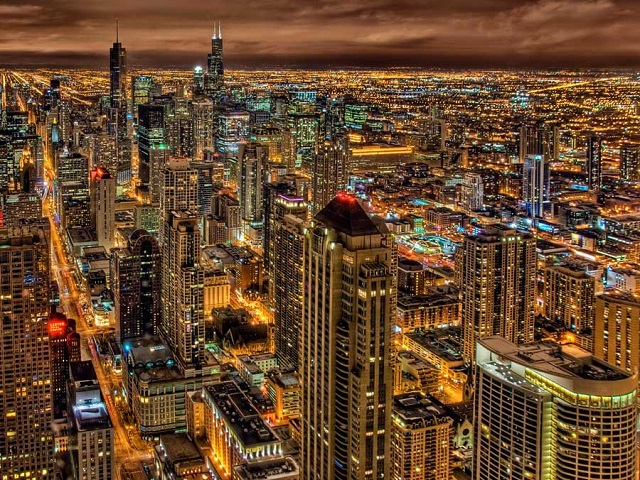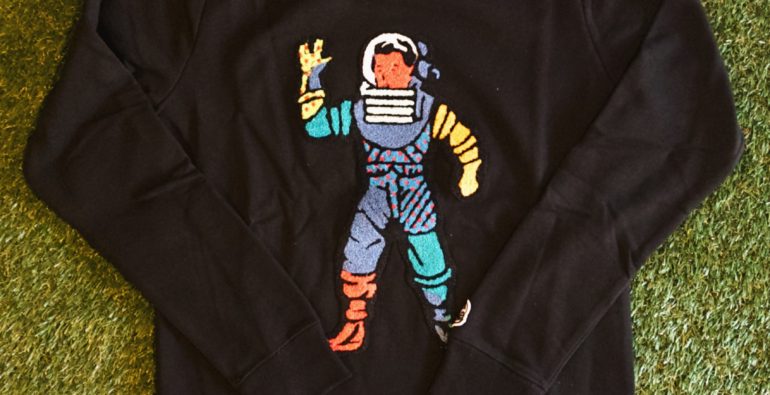I’ve had the opportunity to become a part of something. A scene that is increasingly
seeing more and more national press. A culture that is steeped in history. That has changed
the way people think. Has redefined the boundaries of contemporary music, and has morphed
and evolved to grow with the times…(click after the jump to read the rest of article)

But has it become unrecognizable today? As both a fan of
the golden era and an artist currently trying to navigate the hip hop industry, in one of the largest
markets in America, I’ve watched an amalgamation of cultures and trends influence Hip Hop in
Chicago. A genre that has ingrained itself into current popular culture by developing a sound and
a flow that has come to transcend generations. From Common to Rhymefest, Kanye West,
Twista, Lupe Fiasco to Keef, Chance, and TREE; we have witnessed a growth and change in
both the sonic landscape and the lyricism of hip hop music.
The internet has made it all possible. With the rise of social media and the birth of Pro
Tools, we have witnessed artists exploring sounds and styles that they hadn’t before. Influences
broaden, respects for different forms develop, the ability to experiment becomes easier and
more accepting. This is nothing new. This is simply the nature of everything. You either evolve,
or die. When Diane Sawyer was on television asking the question, “When will this hip hop fad
end?”, if we wanted it to remain as we first fell in love with it, as old school heads, we should’ve
stopped then. Stopped pushing the boundaries, stopped collaborating, and stopped believing.
Then like so many short lived trends it would’ve been crystallized at its best, and we could move
on to something entirely different. But that didn’t happen. That couldn’t happen. Hip Hop is so
much more than an offshoot of something bigger. It’s Do or Die, it’s Da Brat, it’s Rubber Room,
it’s Sasha Go Hard, it’s Tomorrow Kings, it’s Chance, it’s Save Money. You can’t put hip hop in
one box anymore. It has overgrown it’s surroundings (like any force of nature) and has infiltrated
and expanded on to other types of music and entertainment.
This is simply the natural progression of an artist. I’ve heard many local veterans of
Chicago hip hop cry treason to what is currently populating the airwaves, and I’ve seen
youngsters born after 36 Chambers take in a culture and pick up where the OG’s left off, in spite
of the criticism. We should be teaching, we should practice acceptance. So many things we
love go away, thankfully hip hop is still here. No one got anywhere from criticizing an entire
generation. All that criticism does is entrench people deeper into their opinions. An artists
natural objective is to create, and hopefully create something new. I would hope we can all
agree that College Dropout is done and past… Yeezus moved forward and so too should the
culture. “Time and youthful irreverence will bring forth a new age no matter what,” Skech185 of
Tomorrow Kings explains. What we are seeing with the new progression of young artists filling
up the internet, is that hip hop tradition that we hold dear, is being used and fused into something
new and different to accommodate the current youths tastes and ideals; just as the early DJ’s
did with old Disco and R&B records. The music before them didn’t properly articulate what they
were feeling, so they changed it. Skech185 goes on to explain, “You can be a kid from the hood,
in an area where most cats don’t have internet access at home and pay to get views and listens
on sites to falsify your reach. You can also do tracks with people from all over the world andexchange ideas within seconds.” This makes for a difficult yet common issue. While hustlers and shady websites are able to take advantage of these young and often naive artists, we also see the flip side with people connecting and building with each other no matter the distance that
separates them. The internet brings people together but like anything else in this world can also
corrupt and take you for all you’re worth. It’s being hip to what your goals are as an artist that
keeps you from falling for bogus solicitors and conmen using the internet and its level of
disconnect to get over on unsuspecting youths.
But hey, listen, styles change, past artists have revivals, and new artists emerge. We
can’t expect more from the youth today than we did twenty years ago. “People seem to forget
that early on the genre wasn’t just in one form ‘Boom Bap’, but actually encompassed Electronic
& Disco,” Kmax of WHPK’s CTA Radio explains. I didn’t want to listen to my parents music, I
thought what I listened to was, and is the best music offered, but as an adult I recognize that this
is a biased conclusion. This is the music that crafted my youth. It isn’t the music that crafted
today’s necessarily. Kmax recognizes hip hops issues but adds, “Of course, there was almost a
complete implosion of the art form in dark times due to ignorance, corporate manipulation and
greed, but after almost forty years, we’re still here talking about it.”
There is no going back, there is no hope for a culture that refuses to change. That’s why
hip hop like any other cultural movement will change. With the rise in awareness of the music
being created in Chicago, we are seeing a pattern ripple throughout the nation. “Hip Hop in
Chicago today is evolving and moving past some of the stagnant environments that has hindered
the city in year’s past. A lot of artists are taking more chances musically and understand the
merit of branding. Instead of just being a city of followers, there are trends being set here now,
and a lot of acts also understand the importance of being yourself and make music that reflects
you and not mimic what’s already hot,” Kmax points out. This works for Chicago nicely because
of its lack of an individual sound. Unlike New York, LA, and Atlanta, Chicago never has been
labeled with a sound or style that dominates the city. We are a metropolis in the middle of the
country and because of that you have artists with loyalties to a range of sub sets and hip hop
formats. Boom bap, trap, drill (which was invented here), backpack, electronic, art rap, punk
infused, conscious, the list is endless. For many practitioners and fans of the Golden era, this is
sometimes looked at as betrayal, a watering down of a genre, and pandering to a population that
doesn’t understand the essence behind the music. But I’m inclined to believe that this is simply
a stage in the evolutionary process. And it’s because of this cross pollinating that we now find
ourselves amidst a whirlwind of hybrids and youngsters, deviating from the original text.
The issue with a city that pumps out a vast array of styles within one genre is the lack of
ability for the public to grasp a clear definition of the culture. Instead they often choose the most
aggressive and sexy market to exploit. Hence the rise of Drill. This brand of hip hop slapped the
listener in the face and demanded attention. As a lover of Common Sense, I could complain and
despise what the media chose to highlight as Chicago hip hop, but in truth if it wasn’t for Chief
Keef we may not have seen the rise of Chance, Tree, and Vic Mensa. Keef and his people
opened the door for what has come since. And let’s be honest the first one over the hill usuallyhas the toughest road. The fact that the media can point to a teenager and say, “this is all your fault with regards to gun violence in Chicago,” is completely ridiculous. But then again they managed to place the blame of gang and urban violence on hip hop since this thing started. So,
is Chicago hip hop being properly represented to the outsider? “A resounding NO,” says Nigel
from Ground Lift Media, “The negative and violent element of Chicago hip hop is focused on far
too often, and the story usually ends there. That Chiraq documentary was a joke and typical of
noisey / vice.”
Comparisons are often made between generations, it doesn’t matter what it is. Every
generation has a certain affinity to what they grew up around. Music, the arts, and entertainment are all based completely off opinion. What one person finds pleasing to the ear, others may find it lacking and vice versa. So the argument that one is better than the other is sort of moot. Instead we should be looking at the similarities that can be found between the generations. How
one influenced the other and how that influence helped spawn something different. Ultimately
though, the soul of Chicago will always weed out the fake or less than, “I think as a rule we don’t support anything we don’t believe is worth that support. You have to earn your stripes in Chicago,” Nigel Ground Lift Media.
Hank McCoy
@HankTheReal



nice article!